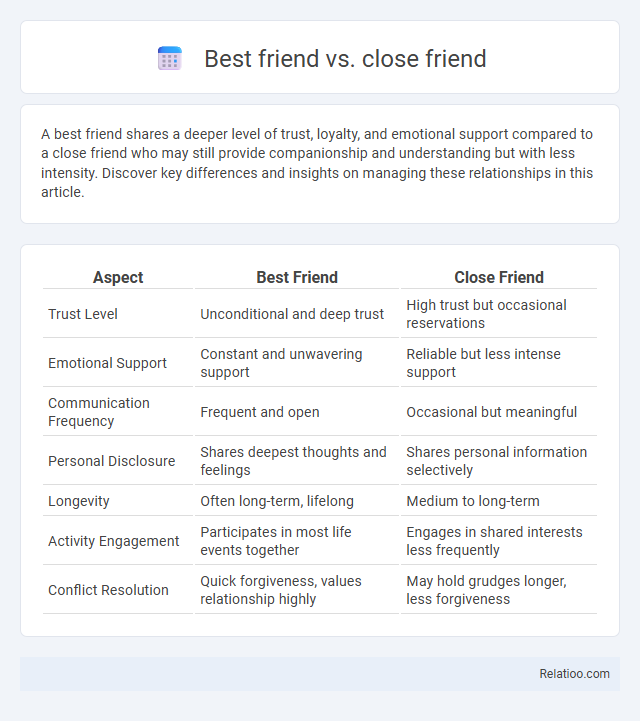A best friend shares a deeper level of trust, loyalty, and emotional support compared to a close friend who may still provide companionship and understanding but with less intensity. Discover key differences and insights on managing these relationships in this article.
Table of Comparison
| Aspect | Best Friend | Close Friend |
|---|---|---|
| Trust Level | Unconditional and deep trust | High trust but occasional reservations |
| Emotional Support | Constant and unwavering support | Reliable but less intense support |
| Communication Frequency | Frequent and open | Occasional but meaningful |
| Personal Disclosure | Shares deepest thoughts and feelings | Shares personal information selectively |
| Longevity | Often long-term, lifelong | Medium to long-term |
| Activity Engagement | Participates in most life events together | Engages in shared interests less frequently |
| Conflict Resolution | Quick forgiveness, values relationship highly | May hold grudges longer, less forgiveness |
Understanding the Difference: Best Friend vs Close Friend
Best friends share an exceptional level of trust, emotional support, and long-term commitment, often knowing intimate details and consistently being there during significant life events. Close friends maintain a strong bond with frequent communication and mutual care, but the depth of trust and disclosure may be less intense compared to best friends. Understanding the difference involves recognizing that best friends are confidants for secrets and vulnerabilities, while close friends provide valuable companionship without necessarily sharing every personal detail.
Qualities That Define a Best Friend
A best friend exhibits unwavering loyalty, deep trust, and an intuitive understanding that surpasses typical friendships, often knowing your thoughts and emotions without needing words. Close friends provide strong emotional support and shared experiences but may lack the intense personal commitment and vulnerability that characterize best friends. Secrets are entrusted only to best friends due to their proven reliability and respect for privacy, highlighting the unique bond and authenticity that define this highest level of friendship.
What Makes Someone a Close Friend?
A close friend is someone who consistently demonstrates trust, understanding, and emotional support, creating a deep bond beyond casual interactions. Unlike a best friend, who may hold a more exclusive or long-term role, a close friend earns their place through shared experiences and genuine empathy, making your relationship reliable and meaningful. Your ability to confide in them and feel valued without judgment defines what truly makes someone a close friend.
Emotional Connection in Best and Close Friendships
Best friends share a deep emotional connection characterized by unwavering trust and mutual understanding, often knowing your thoughts and feelings without needing to express them fully. Close friends provide strong support and empathy, maintaining a reliable presence during both challenges and celebrations, though the bond may be less intense than that of a best friend. While secrets can exist in both relationships, the emotional intimacy in best friendships often allows for greater vulnerability and openness compared to close friendships.
Trust and Loyalty: A Comparative Look
Trust in a best friend is characterized by unwavering loyalty and complete openness, often allowing for vulnerability without fear of judgment. A close friend maintains significant trust but may not be privy to one's deepest secrets or rely on with the same level of unconditional support. Secrets, by nature, require a foundation of absolute trust and loyalty, often reserved for best friends who have consistently demonstrated reliability and discretion.
How Shared Experiences Shape Friendships
Shared experiences play a crucial role in defining the bond between a best friend, close friend, and secret holder. Your best friend often knows you deeply through countless memories and challenges overcome together, creating a unique trust and understanding. Close friends share common interests and regular interaction, while secret holders build intimacy through confidentiality, all shaped by the stories and moments you exchange.
Communication Styles: Best Friend vs Close Friend
Best friends typically engage in open, honest, and frequent communication, sharing both personal successes and struggles without hesitation, which fosters deep trust and emotional intimacy. Close friends communicate with a balance of personal sharing and casual conversation, maintaining comfort and support without the intensity found in best friend interactions. While best friend communication is characterized by vulnerability and consistency, close friend interactions often remain respectful of boundaries and more situationally driven.
Conflict Resolution in Different Friendship Types
Best friends often resolve conflicts through open, honest communication and a strong emotional bond, allowing rapid reconciliation and deeper understanding. Close friends may require more time to navigate disagreements, relying on mutual respect and patience to maintain trust despite occasional misunderstandings. Secrets can complicate conflict resolution, as hidden information creates barriers, making transparency and forgiveness crucial for restoring harmony in the friendship.
The Role of Longevity in Friendship Labels
Longevity plays a crucial role in distinguishing best friends, close friends, and secret friends, as time solidifies trust and shared experiences that define these bonds. Your best friend is often someone with whom you've built a deep, long-term connection, while close friends may have shorter yet meaningful interactions. Secret friends typically emerge from a foundation of trust developed over time, where confidentiality becomes a key aspect of the relationship.
Choosing Between Best Friend and Close Friend
Choosing between a best friend and a close friend depends on the depth of trust, emotional support, and shared experiences you seek in your relationships. Best friends often represent a smaller, more intimate circle with unconditional loyalty and understanding, while close friends provide reliable companionship and mutual respect without the intense emotional expectations. Your decision should reflect the level of vulnerability and commitment you are comfortable with in nurturing a meaningful connection.

Infographic: Best friend vs Close friend
 relatioo.com
relatioo.com